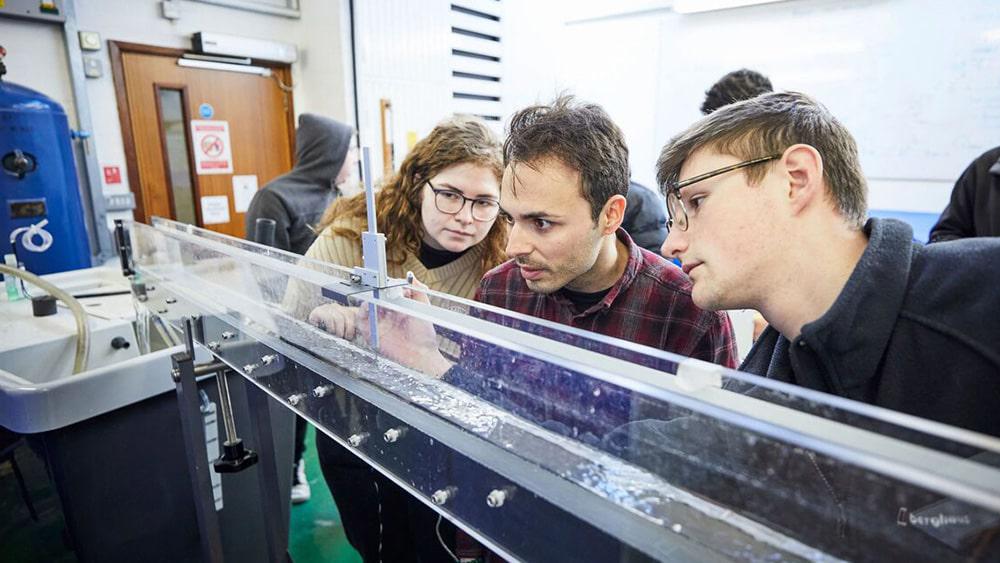HNC
Applied Mechanical Engineering
- Undergraduate
- Engineering

Build a better world.
A career in engineering offers fantastic career prospects and great earning potential. But more than that, it’s your chance to make a mark on the world – to find solutions for some of the greatest challenges facing us as a species, from climate change to food production to sustainable transport.
At Solent we go way beyond theory – we’re all about the practical side of things. You’ll develop the essential understanding of engineering principles and theories, yes – but you’ll then test those theories yourself, getting hands-on with the technology, tools and practical principles as they apply in the real world. Explore current challenges and problems. Build your own turbines. Programme your own robot. Get hands-on experience in labs and with our engineering partner organisations.








Some courses in this subject are accredited or endorsed by:



HNC
FdEng
HNC
BEng (Hons)
MEng
You've viewed 6 of 24 results
Explore more of our subjects and courses
Practical work experience is at the heart of our degrees, and you'll benefit from our strong community and industry links. Find out who you could be working with by visiting our course pages.

Hear from Solent alumni about where their careers have taken them and how studying at Solent prepared them for their future.
Find out more
“From my very first year, in my foundation year, I tried to be like a sponge! I absorbed every bit of knowledge I could.”

We’ve invested over £5 million in cutting-edge engineering workshops as part of the South Coast Institute of Technology, ensuring you have access to state-of-the-art facilities to support your learning and innovation.
At Solent, you’ll explore mechanics and manufacturing across sectors such as aerospace, yacht design, automotive, and component production, with a strong emphasis on hands-on learning and industry applications.
Our facilities include state-of-the-art CAD and drawing offices, advanced 3D printing equipment, laser cutters, and a specialist composite workshop. You’ll also benefit from dedicated labs for applied mechanics, materials, electronic engineering, manufacturing, and robotics, a 60-metre towing tank, a yacht design workshop and a four-metre static stability tank - tools trusted by industry leaders to test designs, including America’s Cup racing yachts.
These resources provide an unparalleled opportunity to gain practical experience and develop innovative solutions in your field.

The perfect blend of technology and expertise - Solent's advanced composites laboratory is backed by 40 years of experience.

Discover Solent's 3D printing and robotics systems, laser cutting, CNC and ancillary finishing services.

A purpose-designed and built laboratory equipped with scientific apparatus, enabling students to gain first-hand experience of practical experiments.

A purpose-built lab for testing of various construction materials using state-of-the-art equipment.

The workshop is purposely set out to accommodate students and allow them to be taught mechanical engineering, and progress with any ongoing project work.

The Library building is open for Solent students and staff to access computers and study spaces, and for browsing the shelves and borrowing items.

Used mainly for the teaching of materials and destructive testing (everything we test, we break!), the lab is also used for some non-destructive testing and students projects.


Solent's £33m Spark building combines interactive teaching spaces with lecture theatres and an atrium with social spaces. Central to The Spark building is the futuristic Pod, which has a full-size lecture theatre and open-topped breakout space.

The towing tank is used for testing hydrodynamic lift and drag components for sailing and motor craft, and incorporates a wave motor.


Our open days are the very best way to see what Solent can offer – a perfect opportunity to talk to our lecturers and meet current students, discover our facilities and explore our campus.

Mechanical Engineering ranks high for teaching satisfaction
30 September 2025
The 2025 National Student Survey showcases the positive impact of Solent's Department of Science and Engineering.
18 July 2025
Professor Susan Roaf, a pioneer in solar energy, has become an honorary Doctor of Engineering at Southampton Solent University.
9 July 2025
Electric trimaran vessel successfully concludes initial sea trials on Southampton water.
12 June 2025
We'll keep you updated with all the latest news from Southampton Solent University and your area of interest.
Keep up to date